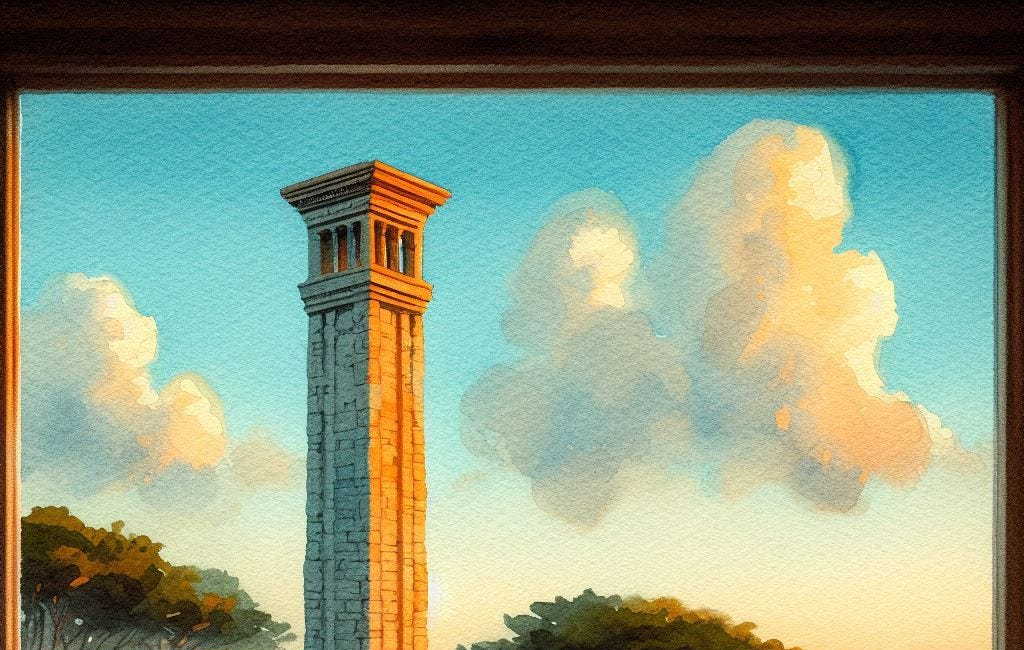I posted something on Facebook this week that opened the door to what I hoped would be an enlightening conversation.
The post was political, expressing my concern about the health of our democracy, and the real possibility that we’re sliding into authoritarianism.
Most of the comments were sympathetic. People nodding with worry of their own.
But one comment struck a different chord. It wasn’t rude. Not even reactive. Just… different.
I asked if he’d be open to elaborating, because I genuinely wanted to understand. I always do.
That impulse—to actually hear “the other side”—is real for me. Not performative. Not a setup. In fact, I once took a StrengthsFinder assessment and out of all the values, curiosity ranked number one for me.
He replied with a long, considered comment and this was the gist of it:
The Constitution protects us from authoritarianism, no matter who’s in power.
Progressive language and DEI efforts feel alienating and unfair.
Conservative white men are censored, excluded, misunderstood.
America isn’t fundamentally bigoted—and saying so is what’s truly divisive.
Elections should be respected, and Trump represents the will of many good Americans.
He wants respect, dignity, and open dialogue without judgment.
And honestly? I was delighted. Appreciative.
This was a rare—real exchange. One where someone from a vastly different viewpoint took the time to articulate their beliefs without venom or mockery.
I responded with equal care to two of his points, asking follow-up questions to deepen the dialogue.
But a couple days later, he messaged me privately, saying he just didn’t have time to respond. But maybe someday we could talk in real time.
I told him I’d welcome that. And I meant it.
Since then I’ve been sitting with that exchange—how it felt to be connecting across real differences—and wondering:
How can I use my writing to bring more people together?
A few days later, that question found its way into a different kind of conversation.
A friend of mine was doing research for a new startup he’s launching—one that uses AI to connect people with ancient wisdom. Specifically, the I Ching, or Book of Changes, a 4,000-year-old Chinese divination text (dating back to roughly 1000 BC). It’s been used for centuries to gain clarity in moments of uncertainty.
The core of it is made up of 64 hexagrams—symbols made of six stacked lines, either broken or unbroken, representing different patterns of change.
Typically you bring a question to it, and the I Ching offers a mirror.
I’m no expert—only vaguely familiar with its wisdom—but I love to approach these experiences with an open mind so I joined the 30-minute call to help him test the experience.
My friend asked me to bring a question to mind. I landed on the one that had been knocking around in my head for days:
How can I use my writing to bring more people together, given the political backdrop we’re living in?
He told me to hold the question in my mind, close my eyes, and say “stop” six times—whenever it felt right.
He would be drawing lines and each stop would ultimately form a specific hexagram.
We began.
And over the course of a few minutes, I uttered six stops.
When we were done, he looked at the result and said:
“Hexagram 38. Kui.”
The translation for this?
Opposition, Contradiction, or Divergence.
I learned that at its heart, Hexagram 38 is about seeing and navigating differences—in relationships, viewpoints, values, or circumstances. It recognizes discord or disconnection, not as a failure, but as a natural phase in the cycle of change. When approached with clarity and integrity, opposition can actually illuminate truth and strengthen connection through contrast.
Of course that was the message.
Because that’s exactly what this moment feels like: a collision of contradictions.
Different values. Different visions. Different versions of what it means to be American, to be free, to be right.
We’re all feeling it.
Opposition isn’t just showing up on social media threads.
It’s showing up at dinner tables. On campuses. In courtrooms. In voting booths.
We are not aligned.
And yet—we are still here—in this reality—in this moment, in this country.
Breathing the same air. Trying, in wildly different ways, to protect what we love.
Hexagram 38 doesn’t condemn opposition.
It names it.
It says: This, too, is part of the pattern.
Not a mistake. Not a glitch.
Just a moment in the cycle of change.
Opposition, it tells us, is not the enemy. It is a mirror.
And if you are brave enough to look into it—really look—you might see something true. Not just about the other side. But about yourself.
The I Ching describes this hexagram with the image of fire above, lake below.
Two elements occupying the same space, but moving in different directions.
Fire rises.
Water rests.
They are not in harmony.
They do not blend.
But they coexist.
This, it says, is a time when forces diverge.
When what once felt shared—values, goals, language, identity—feels fractured. And that fracture brings tension. Disconnection. Even despair.
But it can also bring clarity.
Because when you’re standing across from someone who sees the world entirely differently, you are asked—maybe for the first time in a long time—What do I really believe? Where do I stand? What matters most to me?
Opposition, when met with honesty and integrity, can sharpen your vision. It can strip away the static. It can show you what’s yours to protect, and what’s just noise.
But here’s the part I keep coming back to—and maybe it’s the part that’s most relevant to the times we’re living in: Opposition doesn’t have to be separation.
We don’t have to disappear into our echo chambers.
We don’t have to label everyone who challenges us as ignorant or evil.
We don’t have to lose each other completely.
Because beneath all the rhetoric—beneath the talking points and tribal lines—I still believe that most people want the same things:
To feel safe.
To be seen.
To have a voice.
To belong.
And if we can remember that, even when we’re standing on opposite shores—we might just find a bridge.
Not to erase differences.
Not to pretend we agree.
But to stay connected despite it.
Because it’s one thing to talk about opposition in theory.
It’s another to live it, daily.
We are not just disagreeing over spending and cuts.
We are divided over what is true.
What is just.
What is real.
There are people who believe January 6th was a patriotic protest.
There are people who believe it was an attempted coup.
There are people who believe Trump is going to save America.
And people who believe he’s a threat to democracy itself.
There are people who believe that teaching about racism is itself racist.
That diversity, equity, and inclusion are dangerous ideologies.
That “wokeness” is what’s tearing the country apart.
And these people have evidence to support their beliefs.
There are people who feel silenced.
And people who feel erased.
People who fear their freedoms are slipping away.
And people who’ve never had full access to freedom in the first place.
And these people are not wrong. Their feelings, their experiences are valid.
We are not living in the same America.
And that’s the heartbreak.
But it could also be the doorway.
Hexagram 38 doesn’t promise peace.
It offers something perhaps more useful right now: perception.
It says—look closely. This tension you feel? It’s revealing the deeper work.
Not how to win.
But how to witness.
Not how to dominate.
But how to discern.
Not how to avoid opposition.
But how to move through it with clarity, dignity, and truth.
So that’s the question I leave with you:
When you look into the mirror of opposition, what do you see?
We are fire and lake.
Rising and resting.
Different in direction, but still in the same field.
May we learn how to meet this moment—not with fury or fear, but with the kind of courage that listens, and the kind of clarity that can hold its shape in the storm.
Because opposition is not the enemy.
It’s an invitation.
In case you missed it…
The Naked Truth
A coming-of-age misadventure set in Finland, involving nudity, a sharp stick, and 2,800 unexpected onlookers.














Share this post